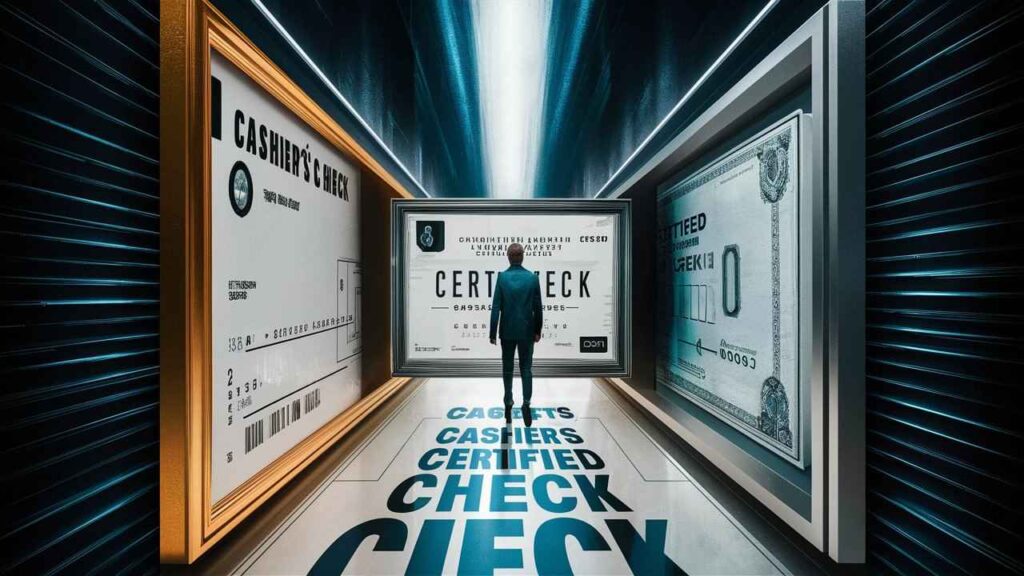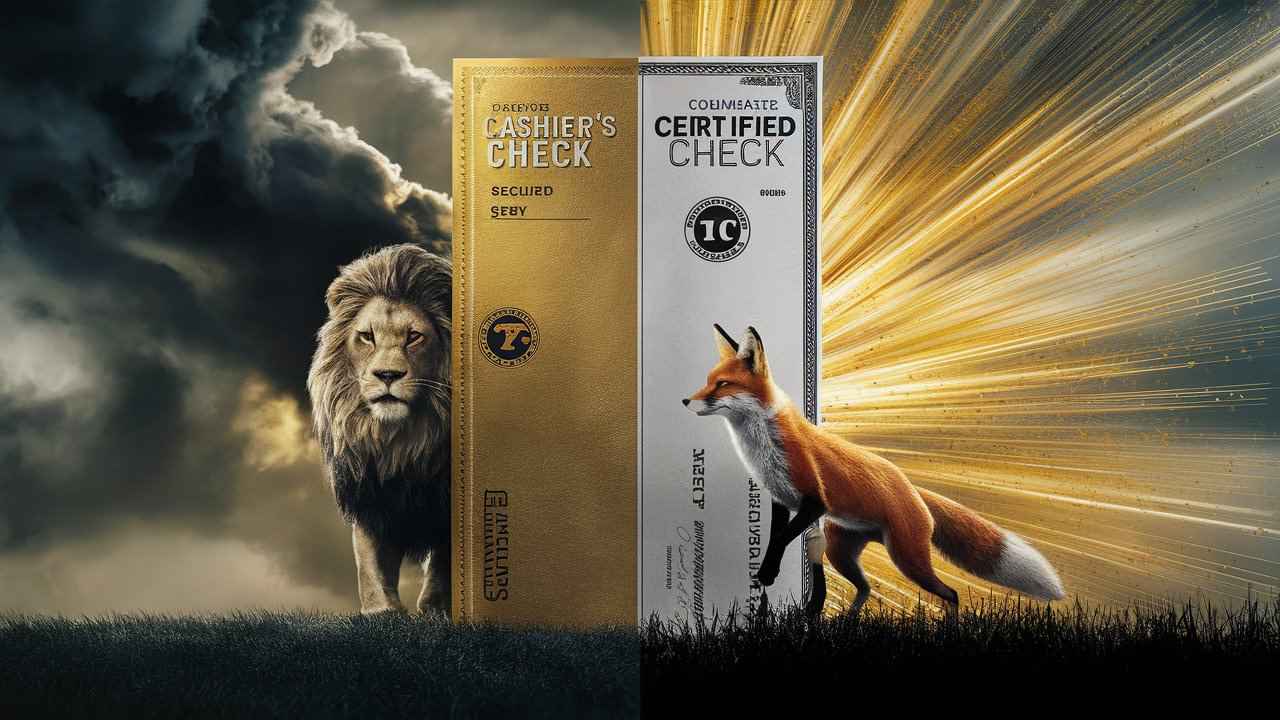A Tale of Two Checks
Ah, the world of checks! A whimsical domain where money changes hands without the ever-dreaded digital glitch. The question arises: should you wield a cashier’s check or a certified check in your financial quests? Choosing the right check is not just a mere task; it can be a thrilling financial adventure, akin to selecting the right sword before heading into battle.

Imagine for a moment the comedic consequences of picking the wrong option: perhaps you hand over a cashier’s check at the car dealership, only to be met with a bemused look from the salesman. “I’m afraid we only take certified checks here,” he says, while you slowly turn crimson. Fear not, for this guide will illuminate the path to understanding these two distinct types of checks and help you avoid any financial faux pas!💵
What is a Cashier’s Check?
Let’s break it down. Acashier’s check is not just a fancy piece of paper, but rather a financial instrument that carries the weight of your bank’s guarantee. It’s issued directly by the bank, ensuring that the funds are available and set aside, making it a trusted option for transactions.
How is it issued, you ask? The bank acts as the intermediary, pulling funds from your account and issuing a check that is backed by its own resources. This means that when you present this check, the recipient can rest assured that the money is as good as gold.
Common uses for cashier’s checks include major purchases like real estate, cars, or even those pesky closing costs that pop up during the home-buying process. Whenever large sums are involved, a cashier’s check is often the go-to option for ensuring trust and security.💵

What is a Certified Check?
Now, onto the reliable sibling of the cashier’s check: the certified check. Think of it as the check that double-checks itself. A certified check is a personal check that the bank has verified and marked as good. It assures the recipient that the funds are there, and that they will be available when it’s time to cash in.
So, how does it work? The bank verifies that you have sufficient funds in your account before certifying the check. This not only boosts confidence for the recipient but also adds a layer of security to your transaction.
Typical scenarios for whipping out a certified check might include paying for services where a vendor requires proof of payment, such as a down payment on a rental property or during a car sale.

The Key Differences Between Cashier’s and Certified Checks
Let’s delve into the key differences that set these two checks apart. The source of funds is the first clue: a cashier’s check draws directly from the bank’s reserves, whereas a certified check pulls from your personal account. This distinction offers a different level of assurance to the recipient.💵
Signature authority is another factor to consider. When using a cashier’s check, the bank’s signature is the one that matters. In contrast, a certified check bears your signature, but carries the bank’s endorsement verifying its authenticity.
In terms of security levels, cashier’s checks typically provide better protection against fraud, as they are harder to forge than personal checks. Still, it’s wise to exercise caution with both, as counterfeit checks can still lurk in the shadows.

How to Obtain a Cashier’s Check
Ready to snag a cashier’s check? Here’s your step-by-step guide. First, visit your local bank or credit union💵no magical incantations required! Bring along a valid form of identification, such as a driver’s license or passport, and be prepared to provide the funds needed for the check, plus any applicable fees.
Documentation is key! Don’t forget your ID. The bank will need to verify your identity, ensuring that you are who you say you are💵no impersonators here, please!
As for fees, expect to shell out a small amount, usually ranging from $5 to $15. But hey, peace of mind is priceless, right?
How to Obtain a Certified Check
Now, let’s embark on the journey to acquiring a certified check. Similar to obtaining a cashier’s check, your first step is a trip to the bank. Be sure to bring your valid ID and, of course, the funds needed for the check.
Necessary paperwork? You’ll need to provide proof of funds, which is typically just your bank account balance. The bank will then certify the check, making sure that it’s good to go!
As for costs, prepare for a slight financial dent, as banks usually charge a fee for certifying checks. But think of it this way: you’re paying for the peace of mind that comes with having a verified check in hand.

Processing Time: Cashier’s vs. Certified Checks
So, how long does it take for each type of check to clear? Generally, cashier’s checks clear faster because they are backed by the bank, often processing within the same business day. Certified checks, while reliable, might take a bit longer since they require the bank to verify funds first.
Factors influencing processing speed include the recipient’s bank policies and the type of transaction. If you’re in a pinch, cashier’s checks are typically better for urgent transactions, as they carry a bank’s guarantee of available funds.
Security Features: Keeping Your Money Safe
Security is a top priority when it comes to checks. For cashier’s checks, fraud protection measures are in place to minimize the risk of counterfeit checks. Most banks include watermarks, unique serial numbers, and other security features to deter forgery.
The risk of forgery is a valid concern. While cashier’s checks are generally more secure, Certified checks can be counterfeited as well. To avoid becoming a victim, always verify the authenticity of any check you receive.
A few tips for verifying authenticity include checking for the bank’s contact information and calling to confirm the check’s legitimacy before cashing it. A little due diligence goes a long way!

Acceptability: Where Can You Use Each Check?
Where can you use cashier’s checks? The answer is simple: many places accept them, especially for significant transactions like buying a house or a car. They are widely recognized and trusted, making them a preferred choice for many vendors.
Certified checks also enjoy broad acceptance, particularly when dealing with service providers or landlords. However, some organizations may have specific preferences, so it’s always wise to check ahead.
Are there places that prefer one over the other? Generally speaking, cashier’s checks tend to be more universally accepted. Still, certain situations may call for the reliability of a certified check.
Fees and Costs: The Hidden Expenses
Let’s talk about those pesky fees. Common fees associated with cashier’s checks usually range from $5 to $15, depending on the bank. Certified checks can also incur similar fees, but sometimes they may be slightly higher due to the extra verification process involved.
When comparing overall costs, consider both the price of obtaining the check and any potential fees for cashing or depositing them. Always keep an eye out for any hidden expenses that could sneak up on you!
When to Use a Cashier’s Check
Ideal situations for a cashier’s check abound. They’re perfect for significant purchases, such as real estate transactions, car sales, or even large deposits. Anytime you need to provide proof of funds with an air of assurance, a cashier’s check is your best bet.
For example, if you’re buying a home, the seller will often request a cashier’s check for the earnest money deposit. It adds a level of trust to the transaction.
Pros and cons of using cashier’s checks include their high level of security and assurance, but be wary of the fees involved. They may not be necessary for smaller transactions where a personal check would suffice.
When to Use a Certified Check
Now, let’s explore the perfect scenarios for utilizing certified checks. They shine in situations where vendors require guaranteed payment, such as rental deposits or payment for services rendered. If you’re purchasing a car from a private seller, a certified check may provide the peace of mind both parties need.
However, weigh the advantages and disadvantages carefully. While certified checks offer a sense of security, they may not be as universally accepted as cashier’s checks. Plus, you’ll need to account for the time it takes to have the funds verified.
Can You Cancel a Check? The Process Explained
The burning question: can you cancel a check? For cashier’s checks, cancellation policies vary from bank to bank. Generally, if you need to cancel one, it can be a hassle, as the funds are secured by the bank. However, if you act swiftly, there’s often a process in place for cancellation.
What about certified checks? You can indeed pull the plug, but not without some complications. To cancel a certified check, you’ll typically need to go through your bank, provide the check number, and possibly file a report.
Steps to take if you need to cancel either check include contacting your bank immediately, providing necessary documentation, and following any required procedures to ensure your funds are protected.
The Risk of Fraud: Which One is Safer?
Ah, the specter of fraud💵lurking around every corner. Fraud incidents related to cashier’s checks have become more common, especially with the rise of online scams. Thieves may use counterfeit cashier’s checks to swindle unsuspecting victims, leading to financial ruin.
On the flip side, certified checks are not immune to vulnerabilities either. Criminals can and do forge certified checks, so it’s essential to remain vigilant.
Tips to avoid becoming a victim include always verifying checks before cashing them, being cautious of unsolicited offers, and maintaining a healthy skepticism in financial dealings.
Legal Standing: Are They Equally Valid?
Legal implications of cashier’s checks are significant. They carry the weight of a bank’s guarantee, making them enforceable and trustworthy in most legal settings. Should a dispute arise, you have a strong ally in the bank’s backing. Certified checks, while still legally valid, can present some challenges.
They are only as reliable as the account holder’s funds. If there are insufficient funds in your account, the check could bounce, leading to legal troubles.
Are there differences in enforceability? Indeed, cashier’s checks often hold more legal clout due to the bank’s backing. However, both checks are generally recognized as valid payment methods in most jurisdictions.
International Use: Are They Globally Accepted?
Can you use cashier’s checks overseas? The short answer is yes, but with caveats. Many international banks recognize cashier’s checks, but acceptance varies by country. Be sure to check with your bank before embarking on an international financial adventure.
What about certified checks in foreign transactions? Similar to cashier’s checks, they can be used, but some countries may not recognize them. It’s prudent to research local banking customs before relying on checks abroad.💵
Navigating international banking regulations can be tricky, so having a backup payment method is wise when traveling.
Alternatives to Cashier’s and Certified Checks
While cashier’s and certified checks are reliable options, other secure payment methods are available. Consider wire transfers, money orders, or even digital payment platforms, which offer their unique advantages.
When to consider alternatives instead? For smaller transactions or when speed is essential, electronic payment methods can be more convenient. They often come with lower fees and immediate confirmation of receipt.💵
Pros and cons of different payment methods depend on the nature of your transaction, but it’s always good to have options on the table!
Real-Life Examples: When They Matter Most
Case studies showcasing the use of both checks reveal the nuances of their effectiveness. For instance, a couple may use a cashier’s check to secure their dream home, only to later discover the seller had a shady past with fraudulent activity.
Lessons learned from real-life experiences emphasize the importance of verifying checks before accepting them. Always do your due diligence!
Avoiding common pitfalls means learning from others. What do others wish they knew? The critical importance of understanding the distinctions between these two checks could save you from potential headaches down the line.💵
Customer Reviews: What Users are Saying
Insights from people who’ve used both checks provide a wealth of knowledge. Users often rave about the security and reliability of cashier’s checks, while some share horror stories of encountering counterfeit certified checks.
Pros and cons as highlighted by real users can inform your decisions. Many appreciate the peace of mind that comes with cashier’s checks, while others opt for certified checks due to their convenience in certain transactions.💵Pros and cons as highlighted by real users can inform your decisions. Many appreciate the peace of mind that comes with cashier’s checks, while others opt for certified checks due to their convenience in certain transactions.
What do the reviews say about convenience and security? Customers frequently emphasize the need for security and clarity in financial dealings, reinforcing the notion that knowledge is power!
Conclusion: Cashier’s Check vs. Certified Check
In summation, the key takeaways from this comparison are clear. Cashier’s checks provide a higher level of security and are generally more widely accepted, while certified checks offer a reliable option for personal transactions where proof of funds is necessary.
Final thoughts on which check to choose should revolve around the nature of your transaction. For substantial purchases, cashier’s checks may be the better option. For everyday dealings, certified checks could suffice.
Encouragement to choose wisely for your financial future cannot be overstated. Whether you opt for a cashier’s check or a certified check, understanding the nuances can lead to smoother transactions and fewer headaches.💵Encouragement to choose wisely for your financial future cannot be overstated. Whether you opt for a cashier’s check or a certified check, understanding the nuances can lead to smoother transactions and fewer headaches.
Additional Resources: Learn More
For those eager to dive deeper into the realm of payment methods, recommended reading on payment options can provide further insight. Many websites and tools offer in-depth comparisons and guides to help you make informed choices.
Where to find assistance in your decision-making process? Financial institutions and local banking professionals are great resources to consult. They can offer personalized advice tailored to your unique situation, ensuring you feel confident in your financial endeavors.
People Also Ask
Which is better, a certified check or a cashier’s check?
When it comes to choosing between a certified check and a cashier’s check, it largely depends on the situation. A cashier’s check is often preferred for larger transactions due to the bank’s guarantee of funds, making it a reliable option. However, a certified check can be beneficial when dealing with personal transactions since it verifies that you have enough funds available. Ultimately, the best choice hinges on the specific needs of the transaction.💵
What are the disadvantages of a cashier’s check?
Cashier’s checks do come with their share of drawbacks. One notable disadvantage is the associated fees, which can range from $5 to $15. Additionally, they are not immune to fraud; counterfeit cashier’s checks can exist, leading to financial loss. Lastly, obtaining a cashier’s check may require a visit to the bank, which is not always convenient for everyone.
Do certified checks clear immediately?
Certified checks typically do not clear immediately. While they are more secure than personal checks, they may still take a business day or two to clear, depending on the bank’s processing times and policies. It’s essential to allow sufficient time for the funds to become available, especially if you’re using the check for a time-sensitive transaction.
Is a cashier’s check 100% safe?
While cashier’s checks are considered safer than personal checks due to the bank’s involvement, they are not 100% safe. Fraudulent cashier’s checks do exist, and individuals can fall victim to scams involving counterfeit checks. To enhance security, always verify the authenticity of a cashier’s check before accepting or cashing it.
Can I cash a cashier’s check over $10,000?
Yes, you can cash a cashier’s check over $10,000. However, depending on the bank’s policies, they may require additional identification or documentation for large cash transactions. It’s wise to check with your bank in advance to ensure a smooth process.💵
What is the safest type of check?
The safest type of check is generally considered to be a cashier’s check due to the bank’s guarantee of funds. However, wire transfers also offer a high level of security for transactions, as they involve direct transfers of funds between banks. Ultimately, the safest option depends on the context and requirements of the transaction.
What is the maximum amount for a cashier’s check?
There is typically no strict maximum amount for a cashier’s check; however, banks may have their limits based on their policies or the amount in your account. It’s essential to inquire with your bank regarding any restrictions they may impose.
What happens if a cashier’s check is lost?
If a cashier’s check is lost, the first step is to report the loss to the issuing bank immediately. The bank may place a stop payment on the check, and you may need to provide identification and complete a declaration form. After the stop payment is placed, the bank may issue a replacement check, although there may be fees involved.
Why do people use cashier’s checks?
People use cashier’s checks for various reasons, primarily due to their security and reliability. They are often employed in significant transactions, such as real estate purchases, car sales, and large deposits, where a guaranteed form of payment is necessary. Cashier’s checks offer reassurance to both buyers and sellers, facilitating smoother transactions.
Can a cashier’s check be cashed immediately?
In many cases, a cashier’s check can be cashed immediately at the issuing bank. However, if you attempt to cash it at a different bank, they may place a hold on the funds until the check clears, which can take a day or two. Always verify the bank’s policies regarding immediate cashing of cashier’s checks.
When to use a cashier’s check?
A cashier’s check is ideal for significant transactions where the recipient requires guaranteed funds. Common scenarios include real estate purchases, vehicle sales, or making large deposits for rental properties. They are also suitable for situations where personal checks may not be accepted due to their potential for bouncing.
What is better than a cashier’s check?
Alternatives that may be considered better than a cashier’s check, depending on the situation, include wire transfers and digital payment services like PayPal or Venmo. Wire transfers provide instant fund availability and are highly secure, while digital payments can offer convenience for smaller transactions.
Can I cash a cashier’s check at an ATM?
Cashing a cashier’s check at an ATM is possible at some banks, but it may not be universally accepted. Many ATMs may require you to deposit the check instead of cashing it, and there could be holds on the funds. It’s advisable to check with your bank to confirm their ATM policies regarding cashier’s checks.
Can anything go wrong with a cashier’s check?
Yes, several things can go wrong with a cashier’s check. Fraudulent checks can be issued, leading to financial losses. Additionally, if the check is lost or stolen, recovering funds can be challenging and may require navigating complex bank procedures. Always be vigilant when dealing with cashier’s checks to minimize potential issues.
How long does it take for a $30,000 cashier’s check to clear?
The clearing time for a $30,000 cashier’s check can vary based on the bank’s policies and the transaction’s specifics. Generally, cashier’s checks clear more quickly than personal checks, often within one to two business days. However, it’s essential to allow extra time for large amounts, as banks may scrutinize higher-value checks more closely.
What happens when you write a check over $10,000?
When you write a check over $10,000, banks may impose additional scrutiny due to anti-money laundering regulations. The recipient’s bank may also be required to report the transaction to government agencies, depending on their policies. Always ensure that you have sufficient funds to cover such transactions to avoid overdraft fees or bounced checks.
Why do banks hold cashier checks?
Banks may hold cashier’s checks to mitigate the risk of fraud. When a cashier’s check is presented for cashing or depositing, especially for large amounts, the bank might place a hold to verify its authenticity. This hold can vary in length based on the bank’s policies and the transaction’s specifics.
Who signs a cashier’s check?
A cashier’s check is typically signed by a bank representative rather than the individual purchasing the check. The signature signifies that the bank has verified the funds and guarantees payment, making the check a secure payment method.
Does a cashier check have your name on it?
Yes, a cashier’s check usually includes the name of the purchaser, indicating who purchased the check. This identification helps the bank track the transaction and provides additional security for both the purchaser and the recipient.
Can you deposit a $10,000 check?
Yes, you can deposit a $10,000 check. However, be aware that banks may place holds on the funds for a few days, especially if you are not a regular customer. Always check your bank’s policies regarding large deposits to ensure you are prepared for any potential delays.








